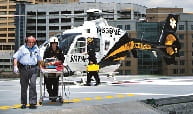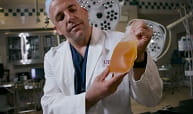
7/25/2018
PITTSBURGH – Two units of plasma given in a medical helicopter on the way to the hospital could increase the odds of survival by 10 percent for traumatically injured patients with severe bleeding, according to the results of a national clinical trial led by the University of Pittsburgh School of Medicine.
The findings, published today in the New England Journal of Medicine, are a significant step toward ensuring the inclusion of prehospital care as a seamless component of health care delivery, rather than merely a transport mechanism.
“These results have the power to significantly alter trauma resuscitation, and their importance to the trauma community cannot be overstated,” said co-lead author Jason Sperry, M.D., M.P.H., professor in the departments of Surgery and Critical Care Medicine in Pitt’s School of Medicine. “This is the first trial in a quarter century to have the potential to alter prehospital care so considerably.”
Plasma is a yellowish liquid that helps blood clot. Blood banks separate it from red blood cells and platelets because the separated components can be used for different life-saving purposes and have different shelf lives. Plasma can last up to a year when frozen, whereas red blood cells and platelets should not be frozen.
The Prehospital Air Medical Plasma (PAMPer) trial was a phase 3 randomized trial that compared outcomes in trauma patients at risk of hemorrhagic shock receiving two units of blood plasma during air medical transport to those who did not. From May 2014 through October 2017, 7,275 patients who were transported via air medical transport to nine participating trauma centers across the country were screened for eligibility for the trial. Ultimately, 501 were enrolled. Most were men who had suffered a blunt trauma, such as from a fall from a height or vehicle crash.
Air medical bases at each participating institution were randomized to either administer plasma or standard care for one-month intervals. When the air transport teams were in their plasma interval, they’d begin administering two units of plasma to the patient as soon as they were deemed eligible for the trial. If the two units were completed during the flight, the team would revert to standard care. If they weren’t completed, the plasma would continue to be administered when the patient arrived at the trauma center.
After 30 days, 76.8 percent of the patients who received plasma were still alive, compared with 67 percent of those who received standard care. Plasma patients also had lower 24-hour and in-hospital mortality. Their blood clotted faster, and they had less need for blood transfusions than their counterparts who did not get the prehospital plasma.
“In 2016, the National Academies of Sciences, Engineering and Medicine proposed a national trauma care system that integrates military and civilian trauma systems to achieve zero preventable deaths after injury,” said co-lead author Francis X. Guyette, M.D., M.P.H., associate professor in the Department of Emergency Medicine at Pitt’s School of Medicine, and medical director of STAT MedEvac. “Reducing mortality by 10 percent with early plasma transfusion is a big step toward that goal.”
The PAMPer trial used thawed plasma, which can last for five days after it is unfrozen. Its short shelf life may be a logistical challenge since air transport teams have to keep track of the expiration dates of the plasma they stock in their helicopters and discard or recycle unused plasma. But plasma that’s never been frozen has a shelf life of 30 days, and freeze-dried plasma, which is approved for use in Europe, though not yet the U.S., can last much longer.
“Using thawed plasma, like we did in our trial, may not be feasible for all trauma centers,” said Sperry. “But there are alternatives available or that are being approved by regulators soon that can extend the exciting results of our trial to more traumatically injured patients, potentially saving hundreds of lives every year.”
Additional authors on this research are Joshua B. Brown, M.D., M.Sc., Louis H. Alarcon, M.D., Brian S. Zuckerbraun, M.D., Matthew D. Neal, M.D., Matthew R. Rosengart, M.D., M.P.H., Raquel M. Forsythe, M.D., Timothy R. Billiar, M.D., Andrew B. Peitzman, M.D., Mazen S. Zenati, M.D., Ph.D., Clifton W. Callaway, M.D., Ph.D., Donald M. Yealy, M.D., Mark H. Yazer, M.D., Darrell J. Triulzi, M.D., Barbara J. Early-Young, B.S.N., Peter W. Adams, B.S., and A. Tyler Putnam, M.D., all of Pitt or UPMC, or both; Brian J. Daley, M.D., University of Tennessee; Richard S. Miller, M.D., Vanderbilt University Medical Center; Brian G. Harbrecht, M.D., University of Louisville; Jeffrey A. Claridge, M.D., MetroHealth Medical Center/Case Western Reserve University; Herb A. Phelan, M.D., M.S.C.S., University of Texas Southwestern/Parkland Memorial Hospital; William R. Witham, M.D., Texas Health Harris Methodist Hospital; and Therese M. Duane, M.D., John Peter Smith Health Network.
This research was funded by U.S. Army Medical Research and Material Command grant number W81XWH-12-2-0023.

Credit: UPMC
A patient is transferred from a STAT MedEvac to UPMC Presbyterian Hospital.

Credit: Tim Betler/UPMC
Jason Sperry, M.D., UPMC trauma surgeon, holds a bag of plasma. Dr. Perry led a clinical trial that determined that two units of blood plasma given to trauma patients on a medical helicopter boosts their odds of survival by 10 percent.

Credit: UPMC
A STAT MedEvac medical helicopter takes off from the UPMC Presbyterian Hospital helipad.
















